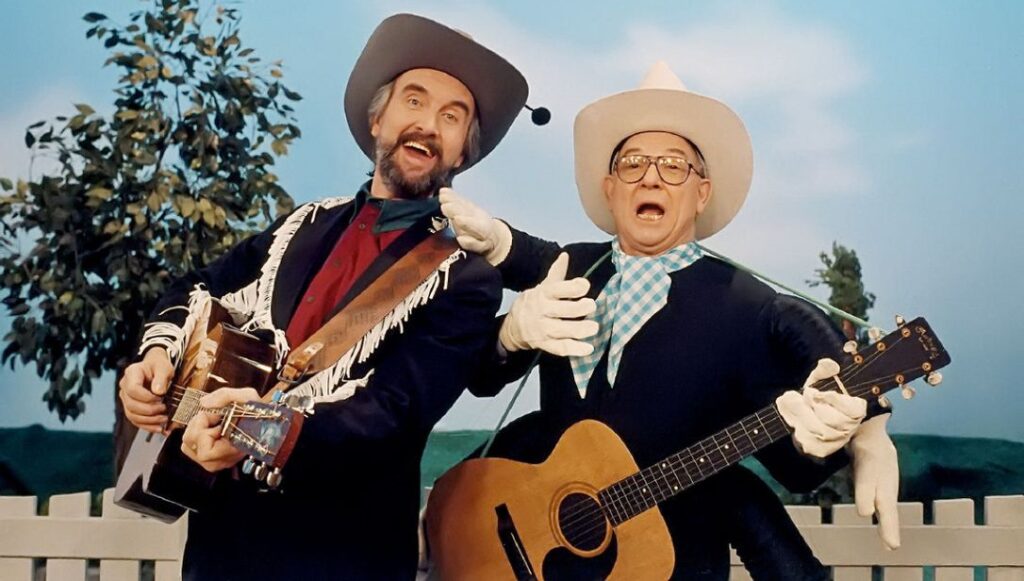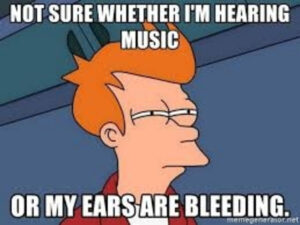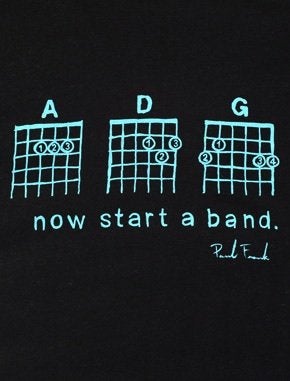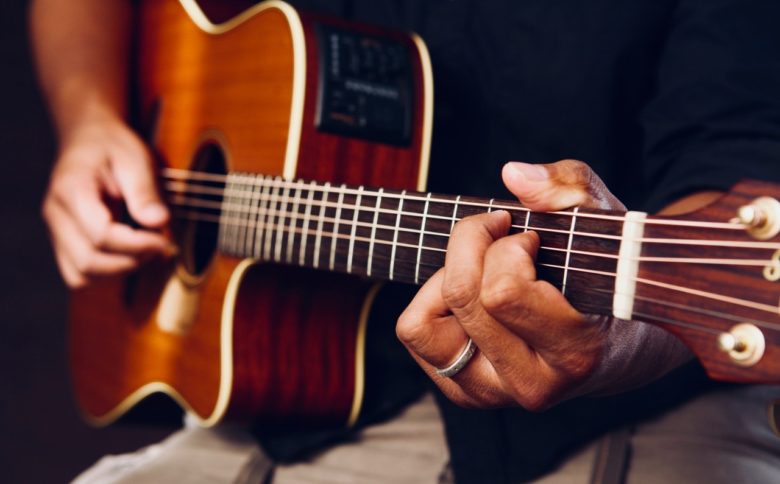I wanted to play guitar since I was four. Namely, when Canadian icon Mr. Dressup would go into his studio “backyard” and play his acoustic with a bunch of puppets. Naturally, I asked my parents for a guitar, and naturally they bought me a toy guitar. I had to wait until my (still) tiny hands were big enough to play my mum’s old guitar at age 13. From there, I was addicted and, some twenty years on, it’s still one of my favourite things to do. Here are a few tips or pieces of advice for anyone new who is considering picking up this passion!

1) Learn to play songs you like.
It goes without saying that if you’re learning to play guitar, it’s probably to play songs you like. I say start there. Learning to play “Mary Had a Little Lamb” in music books is fine, but I didn’t find that half as satisfying as struggling my way through an Oasis song. Find some simple tabs of songs you like – it will make it much more rewarding and motivating to push through and continue playing.
2) Keep going no matter how bad it sounds.
I think it goes without saying that starting is the hardest part. Things are not likely to sound “good” to start. Your hands will struggle to find the strings and their resting place on the fretboard. Your chords will be muted by not pressing hard enough on the strings, or mistakenly using the flats of your fingers. Don’t get disheartened. Keep going even though it might not be immediately rewarding. It really is all practice. And some noise-cancelling headphones for your family. But, mostly practice.

3) Learn to read tabs.
The easiest (and cheapest) way to learn popular songs is to learn to read tabs, which is essentially a shorthand for sheet music. There are so many tabs available on Ultimate Guitar and Guitar 911 – all peer-reviewed and rated, as well as tons of Youtube videos that will walk you through songs and different arrangements. You’ll get to the point where you can even watch an artist play a song, and be able to pick up and reproduce how they play it (and recognize areas where tabs might be incorrect.) Learning an instrument independently has never been easier with all the awesome resources available.

4) Build an ability to recognize basic chord structures.
You can often see that individual notes make up a basic chord structure. It’s good to be able to learn the main chord shapes and recognize them in the music, especially when songs involve fingerpicking and appear as individual notes in tabs. To start, you’ll have to carefully place each finger one-by-one on the fretboard to form a chord, but before long, your hands will be able to quickly switch between chord shapes as muscle memory takes hold. Invest in a chord book (I use Jake Jackson’s Chord Book) so that you can quickly look-up the chords called for in tabs. As Seth Cohen’s shirt on The O.C aptly put: “A, D, G – now start a band.”

5) Do some scales and learn music theory.
Admittedly, I consider myself fairly weak here. But, I did learn to read sheet music for guitar when I started out. Learning some theory and scales will give you a strong foundational understanding that will help accelerate your progress. You might naturally gain these skills, but it might be faster giving it a go off the bat, and will make it a lot easier if you’re planning to attempt some sick solos in your future. Here’s some Tash Sultana scales for inspiration.
6) The strum will come.
At the start, your strumming will be the audible equivalent to Bambi on ice. This is something that comes with time. For me, I’ve found staying “loose” and trying to feel the vibe versus being super attentive and robotic helps me find the rhythm most easily. Maybe it will for you too? The key is to start slow and build from there. There’s a lot of helpful videos for you to listen and practice to and your ear for – and ability to recreate – rhythm will steadily improve.
7) Get the right equipment.
Get some good picks (I prefer ones with grips), a guitar stand, and a chromatic tuner to keep everything tuned up nicely. If you start fiddling around with songs in open tunings, it’s nice to have equipment that will keep that process as friction-free as possible. Also, getting some spare strings and learning to re-string your guitar is also a worthwhile skill to have if you’re in it for the long-haul. But, alas, I only recently acquired these skills during the pandemic when stores were closed so: pot + kettle + black = me.



